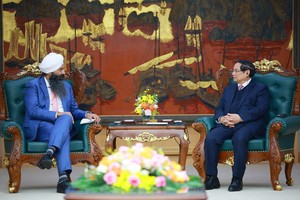One of the biggest energy deals in Russia's post-Soviet history is on the verge of collapse amid questions about both the British giant BP's credibility and the risk of doing business in the country.
The British firm's $16 billion alliance to jointly explore the Arctic with state-held Rosneft was hailed on its announcement January 15 as the "deal of the century" that would help resurrect Russia's dour business image abroad.
It marked a triumphant return for BP after the 2010 Gulf of Mexico oil spill and a chance for Russia to roll back its reputation for coming up with bizarre pretexts for stripping energy majors of their prized possessions.
But few people watching Prime Minister Vladimir Putin assure BP chief Robert Dudley of the government's co-operation could have predicted that, 10 weeks later, an arbitration tribunal would block the tie-up.
The Stockholm panel decided to side with a small but powerful player in the Russian energy saga: a group of billionaires collectively known as AAR, who make up the Russian half of the British firm's TNK-BP venture.
The well-connected Russian businessmen had right of first refusal on the British firm's local deals. They feared that the BP-Rosneft agreement would eventually make their own company redundant.
Now sceptical voices in the media are wondering if BP simply walked into a trap laid for it by a Russian government keen to get sweeter terms on Arctic work -- which Rosneft can only get from a technically-savvy Western partner.
Pointing to the good relations between BP's Russian partners and the government, these commentators ask why they would have dared challenge Putin on something that seemed so dear to his heart.
Amid the drama and confusion of this high-stakes boardroom battle, two things appear certain: the deal as it now stands is ruined and BP's reputation in Russia is not much better off.
"BP's credibility has been undermined," said UniCredit equity analyst Artyom Konchin.
"To try and turn this kind of deal at this level without thinking of all the legal risks and expecting the problems to be resolved on their own is unprofessional," he added.
"They were hoping that the Russian shareholders would be convinced by the state. But that clearly did not happen," said the analyst.
BP has already vowed to try to complete the share-swap portion of the deal on its own. One source close to the company told the Financial Times that the ruling represented another step "in a non-linear, complex world".
But both BP and Rosneft are particularly interested in discovering what riches may be dug up in the Arctic: for both sides, analysts say, this was by far the more important part of the investment.
"We do not believe that BP would want the share swap without the Kara Sea JV and think it is likely to apply to Rosneft and the government," Russia's state-held VTB bank told its clients.
Other possibilities include a buyout of either the Russian billionaires' stake in the TNK-BP joint venture or an out-of-court settlement that would see BP pay them to give up their right to bid on the Arctic project.
Sources within the TNK-BP told Moscow's Vedomosti business daily that the Russian billionaires were ready to sell their stake for $30 billion.
But analysts said BP did not have that kind of money after last year's Gulf disaster. They suggested that the billionaires might be bought out by Rosneft instead.
"In our view, there are two real options remaining now: either Rosneft will decide to replace BP with some other global major in its Arctic JV, or AAR shareholder will have to be bought out (by BP or Rosneft)," Renaissance Capital said in a note.
"We find the first option less likely," the investment bank added.
Russia's secretive energy czar Igor Sechin seemed non-committal: "BP suits us as a partner," he noted. But he added that Rosneft was also willing to sue the British firm for damages.
"Arctic exploration will continue in any event," Sechin added.
Rosneft said it had already been approached by potential replacement offers from the Anglo-Dutch energy giant Shell as well as the US firms Chevron and Exxon Mobil.
Analysts said this meant that Russia was unlikely to suffer much from the Stockholm decision -- and might even end up profiting from it in the end.
"International majors remain interested in Rosneft's assets and the court ruling will only delay the project without changing investors' perception of it," Moscow's Alfa Bank said in a note.
























